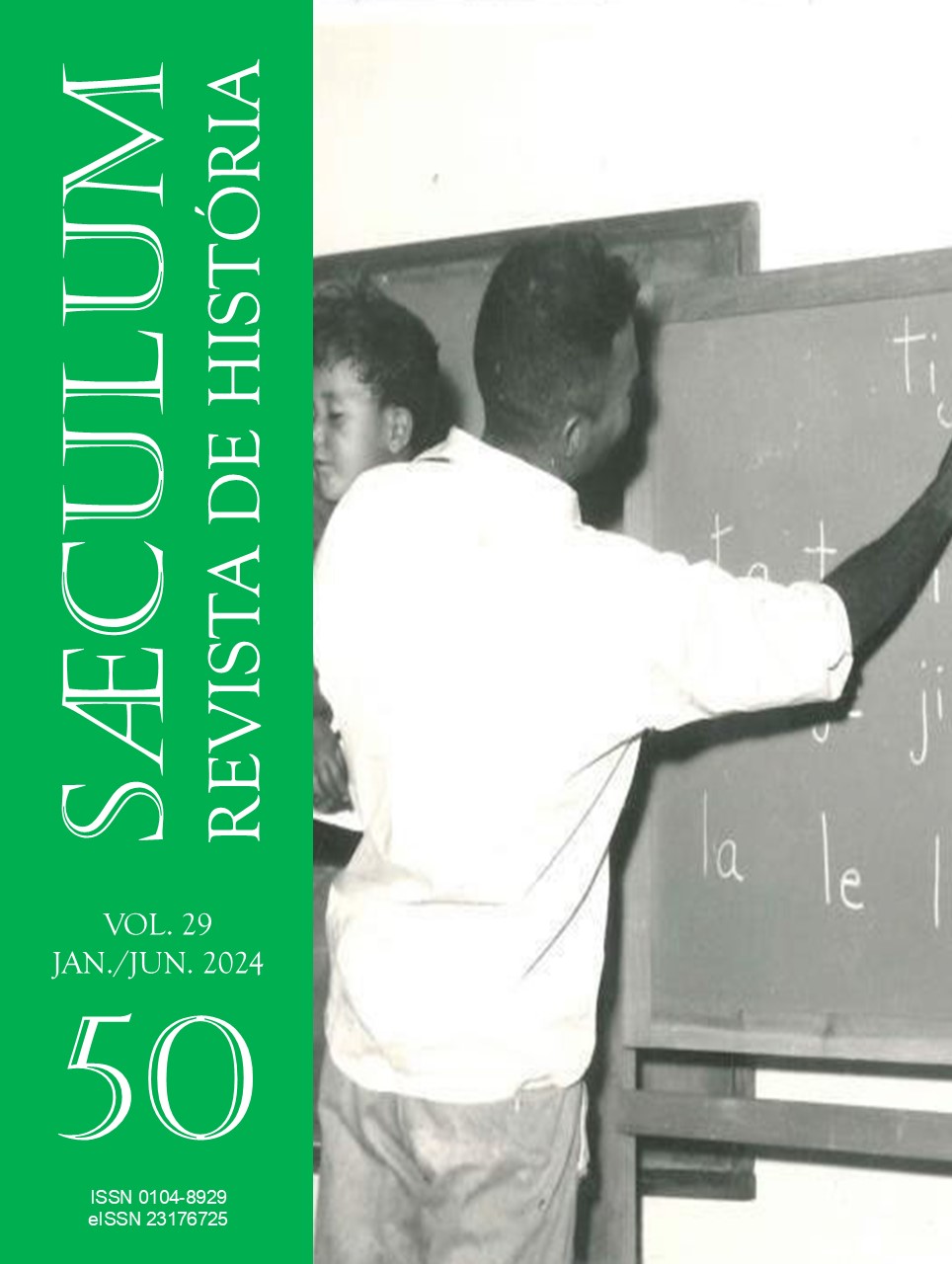História, nacionalismo e democracia
Mito e narrativa na Hungria “iliberal” de Viktor Orbán
DOI :
https://doi.org/10.22478/ufpb.2317-6725.2024v29n50.71514Mots-clés :
Fidesz, Hungria, Nacionalismo, Trianon, Horthy, OrbánRésumé
Esse artigo estuda a relação entre discurso nacionalista e a “virada iliberal” da Hungria a partir da eleição do partido Fidesz, de Viktor Orbán, no pleito de 2010, até 2015. Ele começa examinando os argumentos de autores como Jeffrey Alexander, Quentin Skinner e Tapio Juntunen para poder estabelecer um quadro teórico sobre como atores políticos constroem e manipulam mitos históricos para os seus próprios interesses políticos. Ele então passa a examinar como Orbán especificamente usou e construiu narrativas acerca do Tratado de Trianon e de Miklós Horthy, o líder húngaro do entreguerras. O artigo então argumenta que além de permitir que Orbán criasse uma barreira defensiva contra qualquer tipo de crítica de atores internacionais e domésticos, essas interpretações acerca da história húngara restauram a proeminência de uma abordagem “populista-urbanista” do entreguerras e permitem que Orbán crie uma imagem exclusiva do nacionalismo húngaro. Isso então acaba servindo para legitimar o presidente húngaro e o seu partido ao mesmo tempo em que negam aos partidos de oposição quaisquer chances de reivindicar-se como representantes do povo húngaro.
Téléchargements
Références
Artigos de Periódicos
BOZÓKI, András. Occupy the State: The Orbán Regime in Hungary. Debatte: Journal of Contemporary Central and Eastern Europe, v. 19, n. 3, p. 649–663, 2011. DOI: https://doi.org/10.1080/0965156X.2012.703415
BROWNING, Christopher S. Coming Home or Moving Home? “Westernizing” Narratives in Finnish Foreign Policy and the Reinterpretation of Past Identities. Cooperation and Conflict, v. 37, n. 1, p. 47–72, 2002. DOI: https://doi.org/10.1177/0010836702037001691
ESBENSHADE, Richard S. Symbolic Geographies and the Politics of Hungarian Identity in the “Populist-Urbanist Debate”, 1925–44. Hungarian Cultural Studies, v. 7, p. 177–197, 2014. DOI: https://doi.org/10.5195/ahea.2014.174
FEMIA, Joseph V. An Historicist Critique of “Revisionist” Methods for Studying the History of Ideas. History and Theory, v. 20, n. 2, p. 113–134, 1981. DOI: https://doi.org/10.2307/2504763
GRESKOVITS, George. Re-presenting Moral Ambivalences: Narratives of Political Monologue Regarding András Hegedűs and Pál Teleki. European Review of History: Revue Européenne d’histoire, v. 19, n. 5, p. 749–766, 2012. DOI: https://doi.org/10.1080/13507486.2012.719012
HOBSON, John M.; LAWSON, George. What Is History in International Relations? Millennium: Journal of International Studies, v. 37, n. 2, p. 415–435, 2008. DOI: https://doi.org/10.1177/0305829808097648
JENNE, Erin K.; MUDDE, Cas. Hungary’s Illiberal Turn: Can Outsiders Help? Journal of Democracy, v. 23, n. 3, p. 147–155, 2012. DOI: https://doi.org/10.1353/jod.2012.0057
JUNTUNEN, Tapio. Helsinki Syndrome: The Parachronistic Renaissance of Finlandization in International Politics. New Perspectives, v. 25, n. 1, 2017. DOI: https://doi.org/10.1177/2336825X1702500103
KOVÁCS, Henriett; MINDLER-STEINER, Ursula K. Hungary and the Distortion of Holocaust History: The Hungarian Holocaust Memorial Year 2014. Politics in Central Europe, v. 11, n. 2, p. 49–72, 2015. DOI: https://doi.org/10.1515/pce-2015-0010
LAZAROMS, Ilse Josepha; GIOIELLI, Emily R. The Politics of Contested Narratives: Biographical Approaches to Modern European History. European Review of History: Revue Européenne d’histoire, v. 19, n. 5, p. 653–658, 2012. DOI: https://doi.org/10.1080/13507486.2012.719014
MUELLER, Jan-Werner. The Hungarian Tragedy. Dissent, v. 58, n. 2, p. 5–10, 2011. DOI: https://doi.org/10.1353/dss.2011.0048
RUPNIK, Jacques. How Things Went Wrong. Journal of Democracy, v. 23, n. 3, p. 132–137, 2012. DOI: https://doi.org/10.1353/jod.2012.0051
SKINNER, Quentin. Meaning and Understanding in the History of Ideas. History and Theory, v. 8, n. 1, p. 3–53, 1969. DOI: https://doi.org/10.2307/2504188
SZTOMPKA, Piotr. Cultural Trauma: The Other Face of Social Change. European Journal of Social Theory, v. 3, n. 4, p. 449–466, 2000a. DOI: https://doi.org/10.1177/13684310022224895
SZTOMPKA, Piotr. The Ambivalence of Social Change: Triumph or Trauma? Polish Sociological Review, n. 131, 2000b.
Capítulos de livro
ALEXANDER, Jeffrey C. Toward a Theory of Cultural Trauma. In: ALEXANDER, Jeffrey C.; EYERMAN, Ron; GIESEN, Bernard; SMELSER, Neil J.; SZTOMPKA, Piotr (Orgs) Cultural Trauma and Collective Identity. Berkeley: University of California Press, 2004, p. 1–30. DOI: https://doi.org/10.1525/9780520936768
BIRÓ NAGY, András; BOROS, Tamás; VASALI, Zoltán. More Radical Than the Radicals: The Jobbik Party in International Comparison. In: MELZER, Ralf; SERAFIN, Sebastian (Orgs.). Right-Wing Extremism in Europe: Country Analyses, Counter-Strategies and Labor-Market Oriented Exit Strategies. Berlin: Friedrich Ebert Stiftung, 2013. p. 229–253.
BILESEMANN DE GUEVARA, Berit. Myth in International Politics: Ideological Delusion and Necessary Fiction. In: GUEVARA, Berit Bliesemann (Org.). Myth and Narrative in International Politics: Interpretive Approaches to the Study of IR. London: Palgrave Macmillan, 2016. DOI: https://doi.org/10.1057/978-1-137-53752-2_2
GERNER, Kristian. Between the Holocaust and Trianon: Historical Culture in Hungary. In: DAVIES, Martin L.; SZEJNMANN, Claus-Christian W. (Orgs). How the Holocaust Looks Now: International Perspectives. New York: Palgrave Macmillan, 2006. p. 97–106. DOI: https://doi.org/10.1057/9780230286566_9
JENNE, Erin K. How Populist Governments Rewrite Sovereignty and Why. 2016. Disponível em: https://www.ceu.edu/sites/default/files/attachment/event/15587/erinjennepolberg-consec-2016.pdf. Acesso em: 23 out. 2017.
ROMSICS, Ignác. Changing Images of Miklós Horthy. In: HALMESVIRTA, Anssi (ed.). Cultic Revelations: Studies in Modern Historical Cult Personalities and Phenomena. Jyväskylä: University of Jyväskylä, 2009. p. 93–115. Disponível em: https://jyx.jyu.fi/dspace/bitstream/handle/123456789/23081/spectrum_hun_4.pdf?sequence=1. Acesso em: 01 maio 2018).
Documentos
CONSTITUTE PROJECT. Hungary’s Constitution of 2011 with Amendments Through 2013. 2013. Disponível em: https://www.constituteproject.org/constitution/Hungary_2013.pdf?lang=en. Acesso em: 14 out. 2017.
KÖVÉR, László; SEMJÉN, Zsolt. Office of the National Assembly: Of the Testimony to National Unity. 2010. Disponível em: http://lapa.princeton.edu/hosteddocs/hungary/2082_Trianon_Law_060410_EN1.pdf. Acesso em: 02 out. 2017.
PLATFORM OF EUROPEAN MEMORY AND CONSCIENCE. Members. 2018. Disponível em: https://www.memoryandconscience.eu/members2017/. Acesso em: 29 abr. 2017.
Livros
ALEXANDER, Jeffrey C. Trauma: A Social Theory, Cambridge: Polity Press, 2012.
HOENSCH, Jörg K. A History of Modern Hungary, 1867–1994. London: Longman Group, 1996.
KONTLER, László. A History of Hungary: Millennium in Central Europe. New York: Palgrave Macmillan, 2002. DOI: https://doi.org/10.1007/978-1-137-10563-9
LENDVAI, Paul. The Hungarians: 1,000 Years of Victory in Defeat. London: Hurst and Company, 1999.
MOLNÁR, Miklós. A Concise History of Hungary. Cambridge: Cambridge University Press, 2001. DOI: https://doi.org/10.1017/CBO9781107050716
OLTAY, Edith. Fidesz and the Reinvention of the Hungarian Center-Right. Budapest: Századvég Kiadó, 2013.
ORMOS, Mária. Hungary in the Age of the Two World Wars. New Jersey: Atlantic Research and Publications Ltd., 2007.
RANCIÈRE, Jacques. The Emancipated Spectator. London: Verso Books, 2009.
ROMSICS, Ignác. Hungary in the Twentieth Century. Budapest: Corvina Books, 1999.
Revistas e jornais
AMERICAN HUNGARIAN FEDERATION. Former Prime Minister Viktor Orbán Visits Cleveland to Help Commemorate the 1956 Hungarian Revolution. 2004.. Disponível em: http://www.americanhungarianfederation.org/news_orban.htm. Acesso em: 11 set. 2017.
BALOGH, Eva S. Today’s “Right” and Its Antecedents. 2011. Disponível em: https://hungarianspectrum.wordpress.com/2011/11/06/todays-right-and-its-antecedents/. Acesso em: 14 nov. 2017.
BALOGH, Eva S. Orbán’s Opinion, Miklos Horthy Was an Exceptional Statesman. 2017a. Disponível em: http://hungarianspectrum.org/2017/06/21/in-orbans-opinion-miklos-horthy-was-an-exceptionalstatesman/. Acesso em: 15 set. 2017.
BALOGH, Eva S. A New Declaration of War: Justice for Hungary! 2017b. Disponível em: http://hungarianspectrum.org/2017/06/04/a-new-declaration-of-war-justice-for-hungary/ Acesso em: 09 out. 2017.
BRITISH BROADCASTING CORPORATION. Bitter Hungarians Recall Trianon. 2000. Disponível em: http://news.bbc.co.uk/1/hi/world/monitoring/media_reports/777320.stm. Acesso em: 11 set. 2017.
DEUTSCHE, Welle. Moving Right in Hungary. 2013. Disponível em: http://www.dw.de/moving-right-inhungary/a-16563266. Acesso em: 02 maio 2018.
DUNAI, Marton; KORAYI, Balazs. Hungary Raids NGOs, Accuses Norway of Political Meddling. 2014. Disponível em: https://www.reuters.com/article/us-hungary-norway-funding-ngo/hungary-raidsngos-accuses-norway-of-political-meddling-idUSKBN0ED1QW20140602?feedType=RSS. Acesso em: 26 abr 2018.
THE ECONOMIST. Viktor Orban, an Assertive Hungarian (28/02/2002). 2014. Disponível em: http://www.economist.com/node/1011129. Acesso em: 11 set. 2017.
EURACTIV. Controversial Monument Divides Hungarians, Angers Jewish Community. 2014. Disponível em: http://www.euractiv.com/sections/central-europe/controversial-monument-divides-hungariansangers-jewish-community-303656. Acesso em: 26 abr. 2018.
GARDNER, Andrew. Orbán to Ukraine: Give Hungarians Autonomy. 2014. Disponível em: https://www.politico.eu/article/orban-to-ukraine-give-hungarians-autonomy/. Acesso em: 03 dez. 2017.
NOLAN, Daniel. Hungary Government Condemned over Anti-immigration Drive. 2015. Disponível em: https://www.theguardian.com/world/2015/jul/02/hungary-government-condemned-over-antiimmigration-drive. Acesso em: 01 maio 2018.
SCHULTHEIS, Emily. How Hungary’s Far-Right Extremists Became Warm and Fuzzy. 2018. Disponível em: http://foreignpolicy.com/2018/04/06/how-hungarys-far-right-extremists-became-warm-and-fuzzy/. Acesso em: 27 abr. 2018.
TÓTH, Csaba Tibor. Hungarian Far Right Pushes Moderate Image - and Wins. 2018. Disponível em: http://www.dw.com/en/hungarian-far-right-pushes-moderate-image-and-wins/a-18378981. Acesso em: 02 maio 2018.
TRAUB, James. Hungary’s 500-Year-Old Victim Complex. 2015. Disponível em: http://foreignpolicy.com/2015/10/28/hungarys-500-year-old-victim-complex-nazis-habsburgs/. Acesso em: 02 maio 2018.
VERSECK, Keno. “Creeping Cult”: Hungary Rehabilitates Far-Right Figures. 2012. Disponível em: http://www.spiegel.de/international/europe/right-wing-extremists-cultivate-horthy-cult-in-hungary-a-836526.html. Acesso em: 02 maio 2018.
ZALAN, Eszter. Orbán Upsets Neighbours by Call for Hungarian Minority Self-Rule. 2014. Disponível em: https://euobserver.com/foreign/124145. Acesso em: 03 dez. 2017.
Sites
EGRY, Gábor. Towards a Social History of Trianon and Its Aftermath. 2012. Disponível em: http://www.imre-kertesz-kolleg.uni-jena.de/fileadmin/imre-kertesz-kolleg/Portal/Egry_Gabor_Towards_a_Social_History_of_Trianon_and_its_Aftermath.pdf Acesso em: 26 abr. 2018.
HODONYI, Robert; TRÜPEL, Helga. Together Against Orbán: Hungary’s New Opposition. 2013. Disponível em: http://www.eurozine.com/articles/2013-03-22-hodonyi-en.html. Acesso em: 26 abr. 2018.
LACZÓ, Ferenc. The “Trianon” Debate in the Hungarian Left-Liberal Weekly Élet és Irodalom. 2011. Disponível em: http://www.imre-kertesz-kolleg.uni-jena.de/index.php?id=414. Acesso em: 26 abr. 2018.
DEMPSEY, Judy. Orban Has Gone Too Far. 2012. Disponível em: http://carnegieeurope.eu/strategiceurope/?fa=48892. Acesso em: 26 abr. 2018.
JOBBIK. Gábor Vona Re-elected as the President of the Jobbik Party. 2012. Disponível em: http://www.jobbik.com/gabor_vona_re-elected_president_jobbik_party. Acesso em: 26 abr. 2018.
JOBBIK. Horthy’s Statue Was Unveiled in Budapest City Center. 2013. Disponível em: http://www.jobbik.com/horthys_statue_was_unveiled_budapest_city_center. Acesso em: 26 abr. 2018.
NOVAK, Benjamin. János Lázár Accuses Norway of Interfering in Hungary’s Domestic Affairs. 2014. Disponível em: http://budapestbeacon.com/featured-articles/janos-lazar-accuses-norway-of-interferingin-hungarys-domestic-affairs/ Acesso em: 26 abr. 2018.
NOVAK, Benjamin. Hungary Fears Immigration May Lead to Another Trianon. 2015. Disponível em: https://budapestbeacon.com/hungary-fears-immigration-may-lead-to-another-trianon/. Acesso em: 09 out. 2017.
ORBÁN, Viktor. Viktor Orbán’s Speech on the Anniversary of the 1848 Revolution. 2017. Disponível em: http://www.kormany.hu/en/the-prime-minister/the-prime-minister-s-speeches/viktor-orban-s-speechon-the-anniversary-of-the-1848-revolution. Acesso em: 09 out. 2017.
SALTMAN, ErinMarie; HERMAN, Lisa. Hungary versus Europe. 2013. Disponível em: http://www.policynetwork.net/pno_detail.aspx?ID=4436&title=Hungary-versus-Europe.
Acesso em: 14 nov. 2017.
SCHLEIFER, Yigal. Hungary at the Turning Point: How Prime Minister Viktor Orbán and His Populist-Right Party Is Slowly Destroying His Country’s Democracy. 2014. Disponível em: http://www.slate.com/articles/news_and_politics/moment/2014/10/viktor_orban_s_ authoritarian_rule_the_hungarian_prime_minister_is_destroying.html. Acesso em: 18 set. 2017.
TURBUCZ, David. The Horthy-Cult, 1919 - 1944. 2014. Disponível em: http://eklektika.ektf.hu/dsr/access/6b3a1042-6616-427f-b633-3c324dda2440. Acesso em: 01 maio 2018.
Téléchargements
Publiée
Comment citer
Numéro
Rubrique
Licence
(c) Tous droits réservés Michael Toomey; Fernando Cauduro Pureza 2024

Ce travail est disponible sous licence Creative Commons Attribution - Pas d’Utilisation Commerciale 4.0 International.
A revista Sæculum permite aos autores a manutenção dos direitos autorais pelo seu trabalho, no entanto eles devem repassar direitos de primeira publicação ao periódico.












